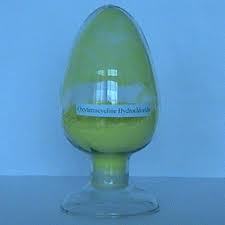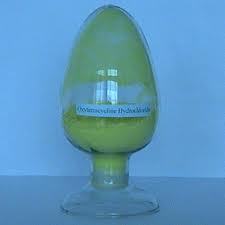
Phenylephrine Hydrochloride
9000 INR/Kilograms
Product Details:
- Molecular Weight 203.66 g/mol Grams (g)
- EINECS No 200-517-3
- Melting Point 143-145 degree
- Particle Size 100 percent passes through 40 mesh
- Storage Room Temperature
- HS Code 29225090
- Shelf Life 4 Years
- Click to View more
X
Phenylephrine Hydrochloride Price And Quantity
- 25 Kilograms
- 9000 INR/Kilograms
- 9000.00 - 9500.00 INR/Kilograms
Phenylephrine Hydrochloride Product Specifications
- Medicine Grade
- 61-76-7
- 203.66 g/mol Grams (g)
- 100 percent passes through 40 mesh
- C9H14ClNO2
- Powder
- 200-517-3
- 143-145 degree
- Room Temperature
- 29225090
- 98%
- 4 Years
- freely soluble in water and in Ethanol
- No Smell
- Almost white crystalline powder.
- 341.1 degree at 760 mmHg
- 3.5 - 7
- Pharmaceutical Intermediates
- C9H14ClNO2
- C9H14ClNO2
- Odorless
- Not Available
- NMT 1.00 percent
Phenylephrine Hydrochloride Trade Information
- Mumbai port
- Cash Advance (CA) Letter of Credit (L/C) Letter of Credit at Sight (Sight L/C) Cash in Advance (CID)
- 1000 Kilograms Per Day
- 7 Days
- Yes
- Free samples are available
- drum
- Western Europe Australia Eastern Europe Middle East Central America South America Asia North America Africa
- ISO, GMP
Product Description
Considered as one of the leading names across the market, we are engaged in offering Phenylephrine Hydrochloride. It is the disodium salt form of edetate with anti-hypercalcemic and anti-arrhythmic properties. It is a heavy metal antagonist, chelates divalent and trivalent metals, forming soluble stable complexes which are readily excreted by the kidneys. This drug can be used to lower serum calcium concentrations. Upon ocular administration, it exerts its ophthalmic effect by chelating calcium to form soluble complexes, thereby removing corneal calcium deposits. We offer this drug at reasonable prices.
Phenylephrine Hydrochloride Properties:
- CAS Number: 61-76-7
- Name: Benzenemethanol, 3-hydroxy--[(methylamino)methyl]-,hydrochloride (1: 1), (aR)-
- Superlist Name: Phenylephrine hydrochloride
- Formula: C9H14ClNO2
- Molecular Weight: 203.6
- Synonyms: L(-)-Phenylephrine hydrochloride;(R)-(-)-1-(3-Hydroxyphenyl)-2-methylaminoethanol hydrochloride;3-Hydroxy-alpha-(methylaminomethyl)benzyl alcohol;
- EINECS: 200-517-3
- Melting Point: 143-145 C(lit.)
- Boiling Point: 341.1 C at 760 mmHg
- Flash Point: 163.4 C
- Appearance: White to almost white crystalline powder
- Risk Codes: 22-36/37/38
- Safety: 26-36-37/39 Details
- Transport Information: UN 3249
Phenylephrine is a medication primarily used as a decongestant, to dilate the pupil, to increase blood pressure, and to relieve hemorrhoids. While marketed as a decongestant, taken by mouth at recommended doses it is of unclear benefit for hay fever. It can be taken by mouth, given by injection into a vein or muscle, or applied to the skin.
Common side effects when taken by mouth or injected include nausea, headache, and anxiety. Use on hemorrhoids is generally well tolerated. Severe side effects may include a slow heart rate, intestinal ischemia, chest pain, kidney failure, and tissue death at the site of injection. It is unclear if use during pregnancy or breastfeeding is safe.
Phenylephrine was patented in 1927 and came into medical use in 1938. It is available as a generic medication. In the United Kingdom the injectable formulation costs the NHS 4 per vial. Unlike pseudoephedrine, abuse of phenylephrine is very uncommon.
Enter Buying Requirement Details





 : nilesh.sheth70
: nilesh.sheth70